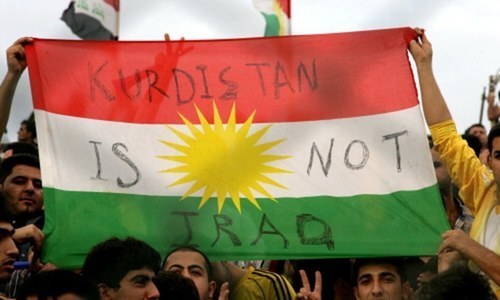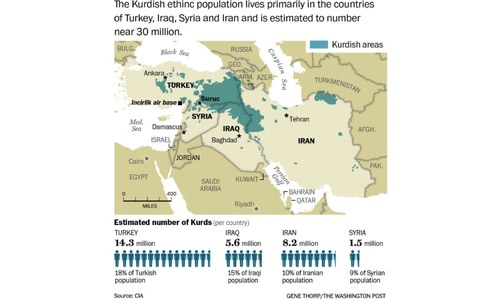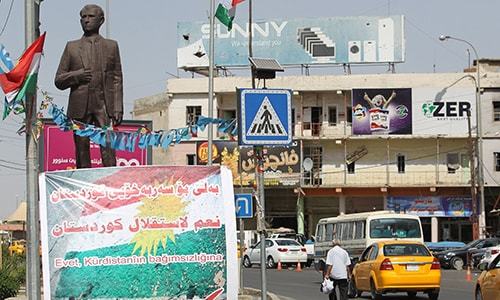Foreign Office Spokesperson Nafees Zakaria, while discussing the recent bid for Kurd secession in Iraq, said on Monday that Pakistan fully supports Iraq’s unity, sovereignty and territorial integrity.
Pakistan is “deeply concerned over the referendum held in the Iraqi Kurdistan region on September,” the Foreign Office spokesperson said in response to a query regarding the matter during the weekly briefing.
“[While] the referendum violates the Iraqi constitution and therefore lacks any legitimacy, it also presents a challenge to peace and security of Iraq and the entire region,” Zakaria said.
Iraqi Kurds backed independence from Baghdad in a referendum held on Sept 25, alarming Ankara as it faces a separatist insurgency from its own Kurdish minority.
Kurds had endorsed secession by nine to one in a vote, angering the central government in Baghdad as well as regional and world powers, who fear the referendum could lead to renewed conflict in the region.
Iraq allows foreigners to leave Kurdistan via Baghdad
Iraq, on Monday, authorised foreigners stranded in Iraqi Kurdistan after an international flight ban to leave the country via Baghdad despite not having a federal visa.
Foreigners who had entered the northern autonomous region on regional visas not recognised by Baghdad could previously not travel to other parts of Iraq.
“Any person can leave the country via Baghdad without paying a fine or for an exit visa,” Interior Minister Qassem al-Araji told journalists.
Baghdad ordered the suspension of international flights to and from Iraqi Kurdistan from Friday in retaliation for the Kurds voting for independence earlier last week.
A top ministry official said he would facilitate journalist visas, which usually take at least a month to process.
Iraqi Kurds gave a resounding 92.7-percent “yes” vote for independence in last Monday's non-binding referendum, which has also sent regional tensions soaring.
Kurdistan can withstand an economic blockade: officials
Kurdish officials have said that they can withstand an economic blockade — threatened by Turkey and the central government — because they are self-sufficient in terms of power generation and fuel supply, and they also have fertile agricultural land.
They also said that three-quarters of the trucks that cross the Turkish border are heading to territory controlled by Baghdad rather than to the Kurdish region, so the Turkish and Iraqi economies would suffer from any blockade.
But travel to the Kurdish region will become harder if airports in Arbil and Sulaimaniya are closed to international flights.
Their autonomous region in Iraq is the closest the Kurds have come in modern times to a state.
It has flourished amid Iraq’s civil war, but may struggle to maintain investment if it is blockaded economically.
Kurdish officials have said that Abadi’s tough response to the referendum vindicates Iraqi Kurdish leader Masoud Barzani’s decision to hold the referendum because they believe Baghdad will not cooperate under any circumstances.
The officials feel that if Baghdad, Turkey, Iran, the United States and the world line up against them, and the Kurds cannot see an end to their hardship, Barzani could come under pressure at home to declare independence.
A diplomatic drive to forestall the referendum failed to persuade Kurdish leaders, some of the United States’ closest Middle Eastern allies, former US officials and experts said.
There were expectations that the US, which said it would not recognise the vote, could use its ties to the Iraqi Kurds to persuade Barzani to cancel the referendum in exchange for a guarantee of talks with Baghdad.
The US bid to stop the referendum failed, experts said, in part because the aging Barzani sees fulfilling aspirations for an independent Kurdish state as his legacy.
The US, major European countries and nearby Turkey and Iran all opposed the referendum as destabilising at a time when all sides are still fighting the militant Islamic State (IS) group.
A spokesman for the US-led coalition said there had been a loss of focus in the fight against IS since the referendum.













































